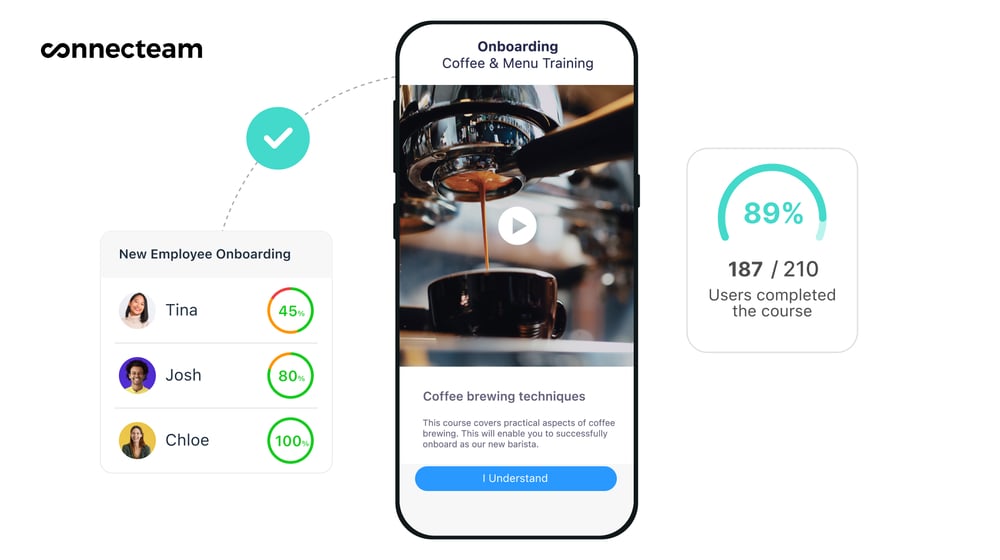The internet connects billions of people worldwide and is an essential tool for most companies. However, there are online communication options beyond the internet for businesses.
What is the difference between intranet and internet? How about intranet versus extranet? What do all of these terms actually mean?
Understanding these terms is essential, particularly as more people are working remotely and companies are emphasizing virtual work environments more.
In this article, we will explore the definitions of internet, intranet, and extranet, and why it’s crucial to know the difference.
What are the Internet, Intranets, and Extranets?
The internet, intranet, and extranet are all computer networks that connect people and resources, but they differ in their purpose and accessibility.
Internet
The Internet is a global network of interconnected computers and servers that allows people to communicate and access information from anywhere in the world.
It is a public network that is open to everyone, enabling them the unrestricted ability to view public websites, send emails, download files, and more.
Intranet vs Internet
The basics of the internet are simple enough, but what’s the difference between the internet and an intranet?
While the internet is open to anyone with a data connection, an intranet is a private network accessible only to employees within an organization.
It is used to share information, resources, and applications within a company, and it is protected by firewalls and other security measures to ensure that sensitive data is not accessed by unauthorized personnel.
The internet is used for both internal and external purposes, whereas intranets are dedicated to internal communication, document sharing, and project collaboration.
Extranet
An extranet is a network that allows people outside the organization to access certain information and resources.
It is a secure network that can connect the organization with customers, suppliers, and other partners, providing them with access to shared resources such as files, databases, and applications.
Access is restricted and controlled, so only authorized users can use the network.
Intranet vs extranet
When comparing intranet versus extranet, it’s important to understand that while both are private networks, an intranet is typically used for internal communication and increased employee engagement, while an extranet allows for limited access by external parties.
Intranets and Extranet Applications in Different Industries

Intranets and extranets are powerful business tools to facilitate communication, collaboration, and knowledge sharing. Here are some examples of how they are used in different industries.
Intranets
Healthcare
Intranets securely share patient records and medical data among healthcare providers. This improves patient care and coordination among different departments and facilities.
Manufacturing
Manufacturers use intranets to share information about production schedules, quality control, and safety protocols with their employees. This ensures that everyone in the organization knows key information and can work together efficiently.
Finance
Financial companies often use intranets to share market updates, financial reports, and compliance guidelines with employees. This keeps them abreast of industry trends and helps them make informed decisions.
Technology
Software developers and engineers use intranets for project management, knowledge sharing, and collaboration. This ensures that the team stays organized, productive, and innovative.
This Might Interest You
Transform the way your team communicates and collaborates! Explore our guide to the best company intranet apps to centralize information, enhance engagement, and keep everyone connected. Find the right intranet solution for your business today!
Extranets
Retail
Retailers use extranets to collaborate with suppliers and track inventory and shipments. For example, a retail chain may use an extranet to share inventory data to ensure the timely delivery of products.
Banking
Banking institutions use extranets to share information with customers, partners, and regulatory agencies. Top uses by a bank can include sharing required information with regulators and enabling customers to access their accounts to view their balance and make online transactions.
Construction
Construction companies use extranets to collaborate with architects, subcontractors, and clients. For example, a company may share blueprints and project schedules with architects and subcontractors through its extranet and provide progress reports to clients.
Key Benefits Of Intranets and Extranets
An intranet is a great way to boost the efficiency and effectiveness of a company’s workforce.
- It increases productivity by making it easier for employees to access the online resources they need, such as cloud-based software, company policies and procedures, and training materials.
- It improves collaboration by facilitating communication between colleagues through tools such as a discussion forum, social media platform, or internal newsletter, reducing the time and effort required to complete tasks.
- It enhances security by limiting access to sensitive information and providing a secure communication and data exchange platform.
An extranet can be very useful in a company’s interactions with various external parties.
- It facilitates communication and collaboration with external stakeholders and can be used to give them access to select information, documents, and data.
- It enhances productivity by providing an external party with the exact tools and resources they need to conduct business with the company.
- It increases security by providing a secure platform for communication and data exchange with external parties.
Why Do Companies Use Internet-hosted Platforms?
Both intranets and extranets can operate on internet-hosted platforms. The benefits of using internet-hosted platforms include:
1. Expandability
Internet-hosted platforms can quickly scale up or down based on the company’s needs. As the business grows, the platform can be expanded to accommodate the increased demand.
2. Cost-effectiveness
Companies often can pay for these platforms on a subscription basis, which means they only have to pay for the services they need. They can avoid the upfront costs of purchasing and maintaining hardware and software.
3. Accessibility
Internet-hosted platforms are accessible from anywhere with an internet connection, which makes it easier for employees to work remotely or from multiple locations.
4. Reliability
Robust security features that protect data and ensure compliance with regulatory requirements are usually included in these platforms.
5. Teamwork
Internet-hosted platforms facilitate collaboration by providing a central location for sharing large volumes of data, project management, and communication.
6. Continuous Improvement
With the help of cloud technology, the service provider can continuously update the platform with new features, software patches, and security measures.
Can an Intranet Function Without the Use Of the Internet?
Most modern intranet software is typically cloud-hosted and still requires internet access for employees to access the systems. While early versions of intranets were hosted on client servers and separate from the internet, these are not commonly used today.
Cloud-hosted intranets offer access anytime, anywhere, which is particularly useful for hybrid workforces. So while you may be able to find an intranet solution that works without the internet, it’s not an option you’d want for your business.
Read our roundup of the best modern intranet software solutions for your business.
Intranet Vs. Internet Vs. Extranet — Which One to Choose?
Now that you’ve learned more about the different types of networks, you might be thinking about whether your company would benefit most from an intranet or extranet.
Or maybe you feel that an internet solution could accommodate both internal and external needs well.
As you consider what kind of platform would be best to implement, consider these key factors:
1. Functionality
Intranets are designed to support internal communication and collaboration, while extranets are used to share information with external parties. The internet is a more general-purpose network that can be used for a variety of functions, such as e-commerce and social networking.
2. Regulatory Compliance
Depending on the industry and country, specific regulations may require certain levels of control over your data. Intranets and extranets may provide better compliance options than the internet alone.
3. Security
Intranets typically offer the highest level of security as they are only accessible within the organization’s network. Extranets, on the other hand, allow external parties to access a limited part of the organization’s network, requiring additional security measures. The internet offers the lowest level of security as it is accessible to anyone with an internet connection.
4. Accessibility to data
Intranets are accessible only within the organization’s network, while extranets are available to authorized external parties. However, anyone with an internet connection can stumble onto your company’s information via a search engine if it’s available on a website.
5. Collaboration with other companies
If collaboration with outside parties that involves sensitive information is the most important part of your organization’s work, then implementing an extranet might be your best next move.
6. Scalability of your business
You should also consider the scalability of the platform. Not every intranet or extranet platform can be scaled to accommodate the growth you anticipate for your company. On the other hand, Internet-based solutions typically can scale to match virtually any size.
7. Cost
Intranets and extranets may require a significant upfront investment, while internet-based platforms typically offer a pay-as-you-go model. However, as the cliché goes, you get what you pay for. What you save in price may be quickly lost to help make your information secure and accessible to only the right people.
How Can an Employee App Help Your Business?
Employee apps are essentially the modern version of the intranet. They are a digital platform for real-time and simplified communication within a company.
An employee app can help your business in several ways, including:
1. Streamlining Communication
Employee apps provide a centralized platform for employees and management to communicate, reducing miscommunication, increasing efficiency, and improving collaboration.
More than that, using Connecteam, managers can easily create and publish schedules, and employees can view their schedules in real time, request shift changes or swaps, and receive shift reminders. This minimizes scheduling conflicts and ensures that shifts are covered appropriately.
Connecteam also has an integrated smart time clock and helps managers to comply with laws and regulations related to labor laws and employment standards. For instance, the app provides features for managing employee time off, tracking overtime hours, and ensuring employees are not overworked.

2. Boosting productivity
By providing employees with easy access to work-related information, such as schedules, tasks, and deadlines, an employee app enables workers to stay organized and on track, ultimately leading to increased productivity.
Employee app features such as dedicated task-related channels, employee mentions, task updates, comments, and push notifications work together to streamline operations and improve efficiency.
Read our in-depth review of the best team management software to increase productivity.
3. Enhancing engagement
An employee app provides colleagues opportunities to give feedback, share ideas, and participate in company initiatives, which enhances their sense of belonging and engagement.
4. Improving training and development
An employee app provides access to online training resources, e-learning modules, and other learning materials, enabling employees to develop new skills and keep current with the latest industry trends.
Connecteam’s employee training app lets you easily create and deliver training materials by utilizing existing documents, PDF files, media, and even web-services like YouTube, Dropbox, Google Drive or your company website.

You can then monitor and track each employees’ training status, course completion, and knowledge level directly from the integrated dashboard.
This allows you to get a more detailed understanding of your employees’ performance as well as identify areas where process improvements can be made.
5. Simplifying HR processes
With features such as recurring tasks, custom digital forms and checklists, task automation, and task-specific communication, employee apps automate HR processes such as leave requests, expense claims, and timesheets. This reduces administrative workload, improves accuracy, and facilitates more efficient HR operations.
By using an employee app such as Connecteam, businesses have a range of customizable features designed to simplify and streamline their HR processes.
Making Your Choice
In conclusion, understanding the differences between the internet, intranet, and extranet is crucial for businesses, especially those that rely on remote work or need to collaborate with external parties.
Intranets and extranets offer powerful communication, collaboration, and knowledge-sharing tools for companies across industries, while the internet remains a global network that connects people and resources worldwide.
By leveraging the benefits of these networks and implementing a modern intranet solution like Connecteam, companies can enhance productivity, efficiency, security, and scalability, while reducing costs and streamlining their operations.
Try Connecteam 100% free for 14 days now. No credit card required.
